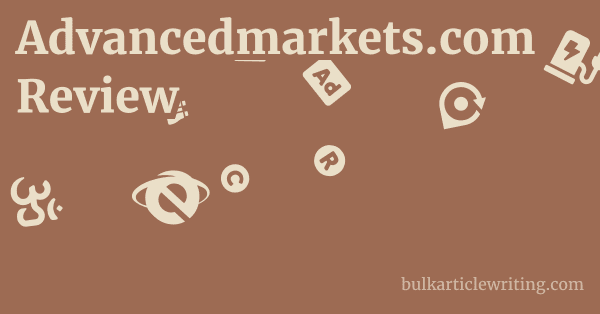Comparing Advancedmarkets.com with halal investment platforms is like comparing apples and oranges, or perhaps more accurately, comparing a highly specialized tool for conventional speculative finance with a framework for ethical, real-economy investment.
Read more about advancedmarkets.com:
Advancedmarkets.com Review & Ethical Implications
Does Advancedmarkets.com Work and Is It Legit?
Advancedmarkets.com Cons: Key Ethical Drawbacks
Advancedmarkets.com Alternatives: Ethical & Shariah-Compliant Options
Understanding Advancedmarkets.com’s Business Model and Target Audience
Advancedmarkets.com Trading Solutions: An In-Depth Look
How Advancedmarkets.com Handles Regulation and Safety of Funds
Advancedmarkets.com Pricing: Understanding the Cost Structure
While both operate in the financial sector, their underlying philosophies, methodologies, and ethical considerations are fundamentally different.
Core Philosophy and Intent
The most significant divergence lies in the foundational principles guiding each entity.
-
Advancedmarkets.com (Conventional/Speculative Finance):
0.0 out of 5 stars (based on 0 reviews)There are no reviews yet. Be the first one to write one.
Amazon.com: Check Amazon for Advancedmarkets.com vs. Halal
Latest Discussions & Reviews:
- Philosophy: Driven by efficiency, speed, and maximizing profit through leveraged financial instruments. It operates within the conventional banking and capital market framework, where interest (Riba) and speculation (Gharar/Maysir) are accepted as part of the business model.
- Intent: To provide institutional clients with superior liquidity, technology, and execution for trading in volatile, derivative-based markets, primarily FX and CFDs, with the goal of profiting from price differences. It focuses on the mechanics of trading, not the ethical nature of the underlying assets or the societal impact.
- Nature: Primarily facilitates short-term, highly leveraged, and often speculative trading.
-
Halal Investment Platforms (Islamic Ethical Finance):
- Philosophy: Grounded in Shariah principles, which emphasize real economic activity, risk-sharing, justice, transparency, and avoiding Riba (interest), Gharar (excessive uncertainty), Maysir (gambling), and investments in prohibited industries (e.g., alcohol, tobacco, gambling, conventional finance).
- Intent: To enable Muslims (and ethical investors) to manage and grow their wealth in a manner consistent with their faith, by investing in productive, ethical businesses and real assets, contributing to the real economy, and avoiding forbidden elements.
- Nature: Focuses on long-term, asset-backed, ethical investments, such as Shariah-compliant equities, Sukuk (Islamic bonds), real estate, and ethical venture capital.
Investment Instruments and Risk Profiles
The types of financial instruments used and their associated risk profiles are starkly different.
-
Advancedmarkets.com: Advancedmarkets.com Pricing: Understanding the Cost Structure
- Instruments: Primarily Foreign Exchange (FX) and Contracts for Differences (CFDs). These are derivative instruments.
- Leverage: Heavily relies on leverage, which amplifies both potential profits and losses. A small market movement can result in significant gains or, more commonly for retail/speculative traders, wipe out entire accounts. Regulatory data often shows high loss rates for retail CFD traders (e.g., 74-89% lose money).
- Risk Profile: Extremely high risk, driven by leverage, volatility, and the speculative nature of the instruments. High potential for capital loss, often exceeding initial investment.
- Ethical Concerns: Direct involvement of Riba (through financing fees), high Gharar (excessive uncertainty due to detachment from real assets), and Maysir (resemblance to gambling due to speculative nature).
-
Halal Investment Platforms (e.g., Wahed Invest, Zoya App):
- Instruments:
- Shariah-Compliant Equities: Investments in stocks of companies that meet specific financial ratios (e.g., low debt, low interest-bearing assets) and whose primary business activities are permissible (e.g., technology, healthcare, manufacturing, but not alcohol, gambling, conventional banking). Zoya App, for example, screens stocks based on these criteria.
- Sukuk (Islamic Bonds): Asset-backed or asset-based instruments that represent ownership in tangible assets or specific projects, generating returns through lease payments or profit sharing, not interest.
- Gold: Often considered a Shariah-compliant asset for hedging and wealth preservation, provided transactions adhere to specific rules (e.g., immediate possession).
- Real Estate: Direct or indirect investment in physical properties, generating rental income or capital appreciation.
- Leverage: Generally avoids conventional interest-based leverage. If leverage is used, it’s typically Shariah-compliant (e.g., through permissible Murabaha structures) and less aggressive.
- Risk Profile: Varies depending on the asset class, but generally aligns with conventional investing risks (e.g., market volatility for equities, property market fluctuations for real estate). The risk is associated with the performance of real assets and businesses, not just speculative price movements. While losses can occur, they are typically limited to the invested capital and not amplified by excessive leverage in the same way.
- Ethical Compliance: Designed to be free from Riba, Gharar, and Maysir, and comply with ethical business activity screens.
- Instruments:
Purpose and Impact
The ultimate purpose and societal impact of engaging with each type of platform also differ significantly.
* **Purpose:** To facilitate efficient speculative trading for institutional profit.
* **Impact:** Primarily financial, focusing on liquidity and market efficiency within the conventional financial system. Its direct societal impact is limited to its role in the capital markets, which can be seen as contributing to economic volatility through speculation.
- Halal Investment Platforms:
- Purpose: To provide Muslims with a means to grow wealth ethically, aligning financial activities with faith. It’s about principled wealth management.
- Impact: Promotes ethical business practices, encourages investment in socially responsible companies, supports the real economy, and fosters financial inclusion for Muslims seeking Shariah-compliant options. It aims for a positive societal impact alongside financial returns.
In conclusion, while Advancedmarkets.com is a technically sophisticated and regulated player in the conventional financial market, it fundamentally operates on principles that are inconsistent with Islamic ethics.
Halal investment platforms, on the other hand, are built from the ground up to adhere to Shariah, offering avenues for wealth growth that are both financially sound and ethically permissible.
For a Muslim, the choice is clear: prioritize platforms that uphold Islamic principles and invest in the real, ethical economy. How Advancedmarkets.com Handles Regulation and Safety of Funds

Leave a Reply